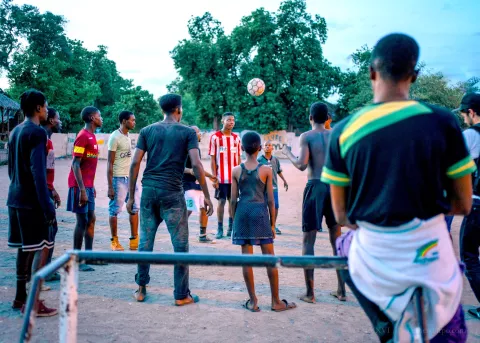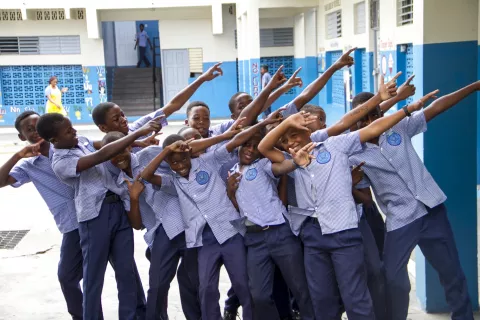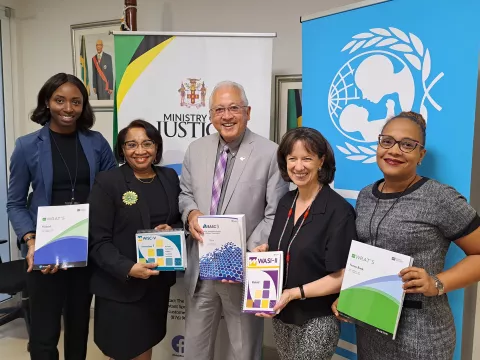MICS data show that Jamaica needs to accelerate steps towards achieving SDG targets for children
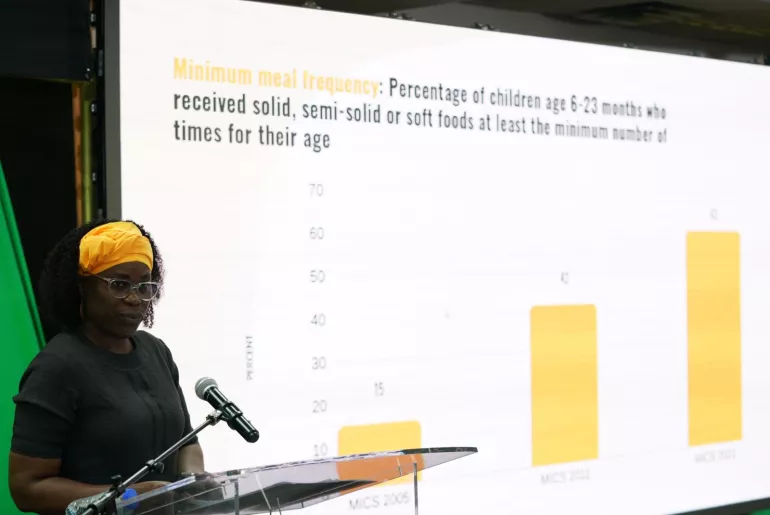
KINGSTON, MARCH 15, 2024
The findings of the 2022 Jamaica Multiple Indicator Cluster Survey have been released to provide policy makers with data to support Jamaica’s efforts towards achieving the 2030 Agenda and the National Development Plan.
The Jamaica Multiple Indicator Cluster Survey (MICS) was carried out in 2022 by the Planning Institute of Jamaica (PIOJ) in collaboration with the United Nations Children’s Fund (UNICEF), the Inter-American Development Bank (IDB) and the Statistical Institute of Jamaica (STATIN), as part of the Global MICS Programme. Technical support was provided by UNICEF and financial support was provided by both UNICEF and the IDB.
This is Jamaica’s fourth MICS. Prior surveys were conducted in 2000, 2005, and 2011. The report ensures that Jamaica has the highest quality data for taking action for the country’s 700,000 children. It is important to note that for the first time, data on children with functional difficulties were disaggregated within the overall results.

There are significant advances. Education data from the 2022 MICS show that 94 per cent of children aged 2-4 are developmentally on track, 99 per cent of Jamaica’s children are completing primary school and 95 per cent of adolescents aged 17-19 have completed grade 9.
However, important challenges remain. The level at which students aged 7-14 are performing in numeracy and reading is worrying. The data reveal that 38 per cent of them have not acquired foundational reading skills while only 50 per cent of them have acquired foundational numeracy skills. Additionally, among children of upper secondary school age, 15-16 years, 82 percent are attending upper secondary school or higher. The national target is 95 per cent.
With respect to health, Jamaica continues to see high levels of vaccination in the first year of life. Based on the observation of vaccination records and mother’s report, all children between 12 and 23 months have been vaccinated against Tuberculosis (BCG vaccine) and approximately 89% of children between 12 and 23 months have received the basic antigens in line with Jamaica’s Immunization Schedule. However, for 2 to 3-year-olds, 55 per cent received all recommended vaccines. The national target is 90 per cent.
In addition to education and health, the MICS 2022 report provides data on social protection, nutrition, child protection, adolescent empowerment and water, sanitation and hygiene (WASH) among other indicators.
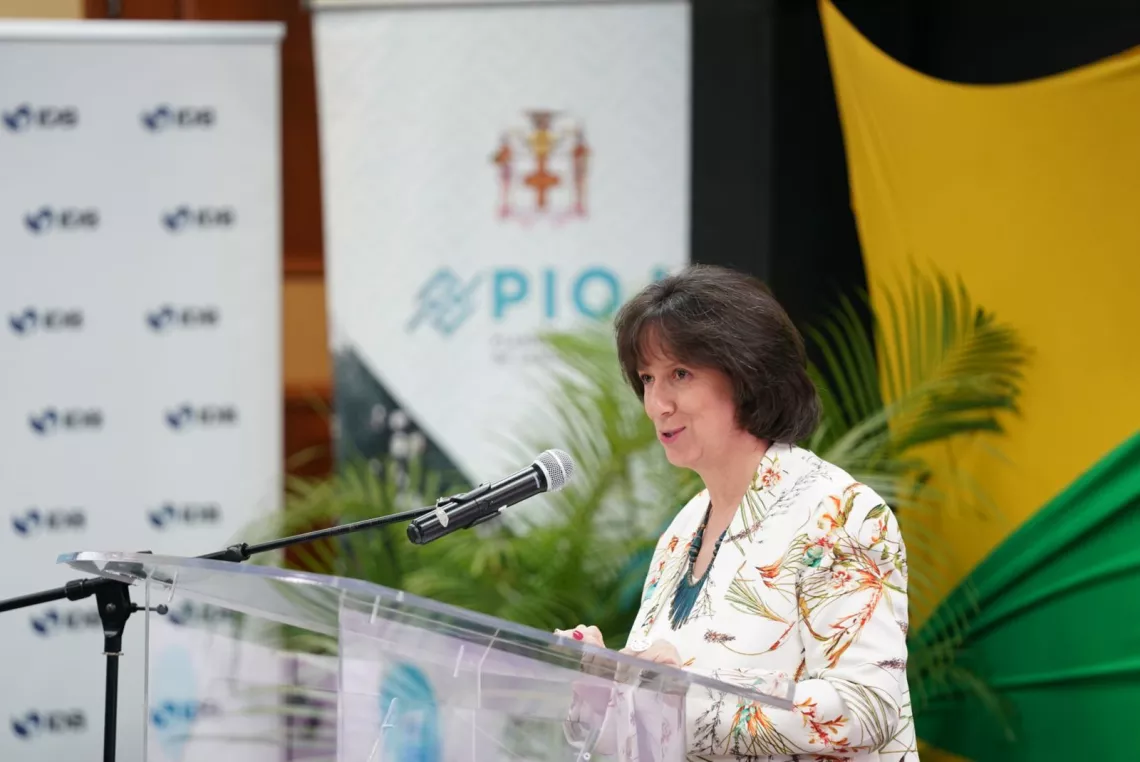
Some of the findings are cause for concern for the agencies monitoring Jamaica’s achievement of the Sustainable Development Goals (SDGs) including the PIOJ, UNICEF, STATIN and IDB. These are:
Social Protection
- Almost a half of the children live in households that fall in the two lowest wealth quintiles.
- Among the poorest households in the country, just over 50% received any type of social benefit.
Nutrition
- Nationally, about 2 in every 5 persons experienced moderate to severe food insecurity in the four weeks preceding the survey. Food insecurity considered peoples’ uncertainty or anxiety about access to food, as well as the quality and quantity of the available food.
- Only 1 in every 4 infants living in the poorest households is getting the minimum acceptable diet compared to 1 in every 2 infants living in the richest households.
- Among children aged 6 to 23 months living in the richest households, about 54 per cent receive a minimum acceptable diet. The challenges are worse for children living in the poorest households, where only 25 per cent receive the minimum acceptable diet.
- Two out of every 5 babies between 0 and 5 months living in the rural areas are being exclusively breastfed, compared to 1 out of every 4 babies living in the urban areas.
Although there is a positive shift in exclusive breastfeeding nationally (0-5 months), the figures reflect only an 8 per cent increase over the last survey in 2011 which was about 24 per cent.
Child Protection
- Approximately 76 per cent of Jamaican children between 1 and 14 years experienced violent discipline in the past month. Violent discipline includes physical punishment and or psychological aggression.
- A big concern is physical punishment among children 10-14 years old accounting for 46 per cent and among children between 3 and 4 years old at 71 per cent. One key finding was that while almost 3 out of every 5 children experienced physical punishment, less than one-fifth of their mothers/caretakers think that physical punishment is necessary to properly raise a child.

Adolescent Empowerment
- Approximately one-quarter of women aged 20-24 years were first married or in a union before 18 years old, while about six percent of them entered their first union before they were 15 years old.
Water, Sanitation and Hygiene (WASH)
10. Approximately 4 out of every 5 persons living in the richest households have access to an improved source of drinking water which is available when needed, compared to just over one-half of the population living in the poorest households.
MICS 2022 provides invaluable insights on more than 160 indicators related to children and women. This comprehensive data set equips Jamaica with the necessary information to assess advancements and obstacles. It will enable the decision-makers to propose proactive measures to prevent setbacks in milestones already achieved and expedite actions in areas where there is a lag in progress. Using the survey data, Jamaica will be able to report on 30 of the 45 indicators related to children that are associated with 11 of the 17 SDGs. This detailed reporting will empower Jamaica to track its performance, identify areas for improvement, and strategically align its efforts to accelerate progress towards a sustainable future for its children and women.
The commitment under the 2030 Agenda to “leave no one behind”, calls for the provision of quality, accessible, timely and reliable disaggregated data and for each country to establish appropriate mechanisms for the regular and timely collection, analysis and publication of data required to monitor relevant social indicators relating to the well-being of children.
The Global MICS Programme was developed by UNICEF as an international multi-purpose household survey programme to support countries in collecting internationally comparable data on a wide range of indicators on the situation of children and women.
These child related indicators should be periodically reviewed by national leaders and decision makers, as is currently done with indicators of economic development.
###
About PIOJ
The PIOJ is the foremost planning agency of the government that seeks to initiate and coordinate the development of policies, plans and programmes for the sustainable development of Jamaica.
About UNICEF Jamaica
We support government and non-governmental partners to promote and fulfil the rights of children, especially the most disadvantaged. Across more than 190 countries and territories, we work for every child, everywhere, to build a better world for everyone.
For information about UNICEF and its work, visit www.unicef.org/jamaica.
Media contacts
About UNICEF
UNICEF promotes the rights and wellbeing of every child, in everything we do. Together with our partners, we work in 190 countries and territories to translate that commitment into practical action, focusing special effort on reaching the most vulnerable and excluded children, to the benefit of all children, everywhere.
For more information about UNICEF and its work for children in Jamaica, visit www.unicef.org/jamaica.

